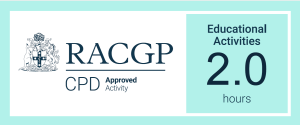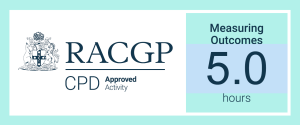This event is a hybrid attendance event, please use the register button above to attend in person, or alternatively use the below link to attend online.
Registration for online attendance
Do you have a question for this session?
You can submit your questions for this session in advance using the following link
This event is RACGP approved for 2 hours of Educational Activities.
with a further optional 5 hours of Measuring Outcomes.


Overview:
Many patients with depression require several treatment steps to achieve remission.
- Treatment Resistant Depression (TRD) is a common problem affecting up to 30% of people with depression with substantial individual and societal impacts.
- There is no universally agreed definition but it is typically defined as an inadequate response to at least 2 antidepressants despite adequate trials and adherence.
Much of the management of depression occurs within General Practice, with access to multidisciplinary care and treatments limited by cost and availability. Treatment options have expanded with Medicare listing of Transcranial Magnetic Stimulation (TMS) in 2021, and PBS listing of eskatemine in 2025 however both these options are available in the private sector only, and so an understanding of a broader array of options is required.
In this session leading experts will review the concept of TRD, outline key factors in assessment, and discuss locally available treatment options in this expanding field including adjunctive pharmacotherapy and psychotherapy, esketamine nasal spray, TMS, and Electroconvulsive Therapy (ECT). Public and private referral pathways for treatment, including options for obtaining psychiatric advice and review, will be discussed by the panel. The use of the Tasmanian HealthPathways to support care and referrals will be highlighted. Questions can be pre-submitted or asked on the evening.
Learning outcomes:
- Outline a clinical approach to the assessment and management of treatment resistant depression (TRD)
- Compare available treatment options for TRD based on efficacy, adverse effects, accessibility, and cost
- Identify available public and private sector referral pathways for advice and management of patients with TRD with reference to the Tasmanian HealthPathways
Speaker and Panelist information:
Professor Malcolm Hopwood is the Ramsay Health Care Professor of Psychiatry, University of Melbourne; based at the Ramsay Clinic Albert Road (RCAR) in Melbourne, Australia. At RCAR, he is the Director of the Professorial Psychiatry Unit. His research areas of interest include psychopharmacology and clinical aspects of mood and anxiety disorders. He was President of the RANZCP between 2015 and 2017 and was President of the Asian Federation of Psychiatric Associations from 2019 to 2022.
Professor Saxby Pridmore was born in Tasmania. He trained as a physiotherapist and worked at the Royal Hobart Hospital before training in medicine. He has specialist qualifications in Psychiatry and four other fields. He became involved in TMS in the mid-1990s, and along with Drs Turnier-Shea and Rybak has researched and published widely on the topic.
Dr Arnob Chakraborti is Clinical Director and a Consultant Psychiatrist for the Adult Community Mental Health Services, South Tasmania. Also, Director of Advanced Training in Adult Psychiatry for the Tasmanian Psychiatry Training Program, RANZCP, and an Accredited ECT Psychiatrist & Trainer at the Royal Hobart Hospital, Department of Health, Tasmania. He holds specialist qualifications in clinical psychiatry, academic psychiatry, and in public health. He has mostly worked within publicly funded health care systems in UK and Oceania. He is interested in the interface of Mental Health with Public Health, in life-course trajectories of mental health conditions, comorbidities of severe enduring mental illnesses, in population-based interventions, and in social determinants of mental health and recovery.
Dr Yvonne Turnier-Shea is a locally trained psychiatrist with wide experience having worked for many years in the public and private system in Australia as well as Germany. She specialises in TMS (Transcranial Magnetic Stimulation) and has contributed to research and treatment provision of TMS over the last 30 years in collaboration with experts in the field worldwide. As co-director of Hobart TMS Yvonne is a strong believer in affordable access to psychiatric treatment for all patients and enjoys Yoga, Pilates and singing in her spare time.
Dr Marzena Rybak is a consultant psychiatrist and a co-director of Hobart TMS. She has extensive experience working for over 20 years as an adult psychiatrist in both the public and private system. As well as working as a psychiatrist, Dr Rybak has , since 1996, been involved in the development of TMS as a treatment modality in psychiatric disorders. She has co-authored over 100 international scientific publications on the subject. She graduated as a medical doctor in both Poland and Australia, subsequently obtaining her fellowship from the RANZCP in 2002.
Dr Anna Seth is a GP currently training towards a second fellowship in Psychiatry. She has a longstanding interest in mental health, women’s health and environmental impacts on health. Originally trained in the UK, she moved to Australia in 2003 and Tasmania in 2011 where she worked in practices in Huonville, Kingston, and more recently in Hobart at The Bubble. She is a clinical editor for HealthPathways with Primary Health Tasmania and is passionate about multidisciplinary mental health education.
